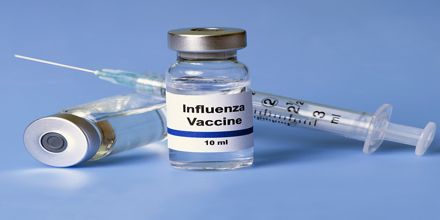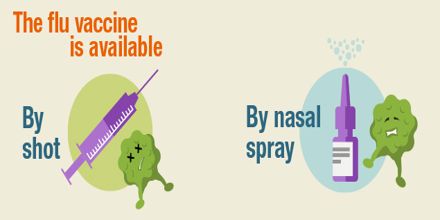The efficiency of the seasonal flu vaccine depends upon numerous factors, including how well the flu strains in the vaccine match the strains in circulation. Some studies show that when strains in the vaccine are a good match with the ones that are circulating, vaccinated persons are 60 percent less likely to catch the flu than people, who aren’t vaccinated, according to the Centers for Disease Control and Prevention (CDC).
Every year, people protect themselves from influenza, or the flu, by getting the flu vaccine. This vaccine, which usually comes as a shot or nasal spray, can reduce your chances of getting the flu by as much as 60 percent.
Flu vaccine efficiency can also vary depending on the person being vaccinated — the vaccine tends to work best in healthy adults and older children, and less well in older adults.

How do flu vaccines work?
Flu vaccines cause antibodies to grow in the body about two weeks after vaccination. These antibodies provide protection against infection with the viruses that are in the vaccine.
The seasonal flu vaccine protects against the influenza viruses that research indicates will be most general during the upcoming season. Traditional flu vaccines (called “trivalent” vaccines) are made to protect against three flu viruses; an influenza A (H1N1) virus, an influenza A (H3N2) virus, and an influenza B virus. There is also flu vaccines made to protect against four flu viruses (called “quadrivalent” vaccines). These vaccines protect against the same viruses as the trivalent vaccine and an additional B virus.
What kinds of flu vaccines are available?
Centers for Disease Control and Prevention (CDC) recommends use of inject-able influenza vaccines (including inactivated influenza vaccines and recombinant influenza vaccines) during 2016-2017. The nasal spray flu vaccine (live attenuated influenza vaccine or LAIV) should not be used during 2016-2017.
Both trivalent (three-component) and quadrivalent (four-component) flu vaccines will be available.
What are factors that influence how well the vaccine works?
How well the flu vaccine works can range widely from season to season. The vaccine’s efficiency also can vary depending on who is being vaccinated. At least two factors play an significant role in decisive the likelihood that flu vaccine will protect a person from flu illness:
1) characteristics of the person being vaccinated (such as their age and health), and
2) the similarity or “match” between the flu viruses the flu vaccine is designed to protect against and the flu viruses spreading in the community.
During years when the flu vaccine is not well matched to circulating viruses, it’s doable that no advantage from flu vaccination may be observed. During years when there is a good match between the flu vaccine and circulating viruses, it’s probable to determine considerable benefits from vaccination in terms of preventing flu illness. However, even during years when the vaccine match is very good, the benefits of vaccination will vary across the population, depending on characteristics of the person being vaccinated and even, potentially, which vaccine was used.
Who Should Not Be Vaccinated?
Centers for Disease Control and Prevention (CDC) recommends use of the flu shot (inactivated influenza vaccine or IIV) and the recombinant influenza vaccine (RIV). The nasal spray flu vaccine (live attenuated influenza vaccine or LAIV) should not be used during 2016-2017. Dissimilar flu vaccines are approved for use in diverse groups of people. Factors that can determine a person’s appropriateness for vaccination, or vaccination with a exacting vaccine, include a person’s age, health (current and past) and any allergies to flu vaccine or its components.
- People who cannot get a flu shot
- People who should talk to their doctor before getting the flu shot

What are the side effects?
According to the CDC, mild side effects from the flu shot include soreness, redness or swelling at the injection site, low-grade fever, and aches. Only about 1 percent to 2 percent of people who get a flu shot will have fever as a side effect, Schaffner said.
High fever
A fever greater than 101°F is not common. If you’re concerned about a high fever, call your doctor.
Severe allergic reactions
Rarely, the flu vaccine can cause a severe allergic reaction. Severe allergic reactions typically occur within a few hours of receiving the vaccine. Symptoms include:
- hives
- swelling
- trouble breathing
- fast heart rate
- dizziness
- weakness
If you have any of these symptoms, call your doctor immediately. If they’re severe, call 911 or go to the nearest emergency room.
For children, side effects from the flu nasal spray can contain runny nose, wheezing, headache, vomiting, muscle aches and fever. For adults, side effects contain runny nose, headache, sore throat and cough. These side effects last a short time compared to the actual flu illness, the CDC says.
















